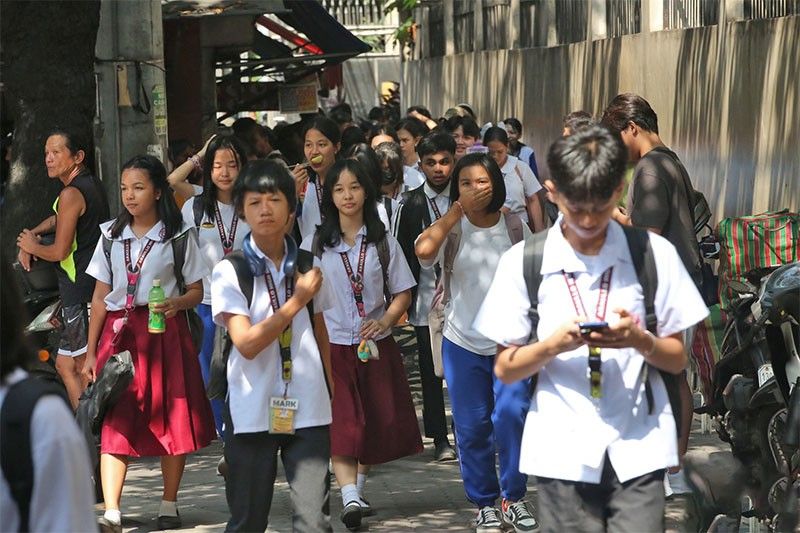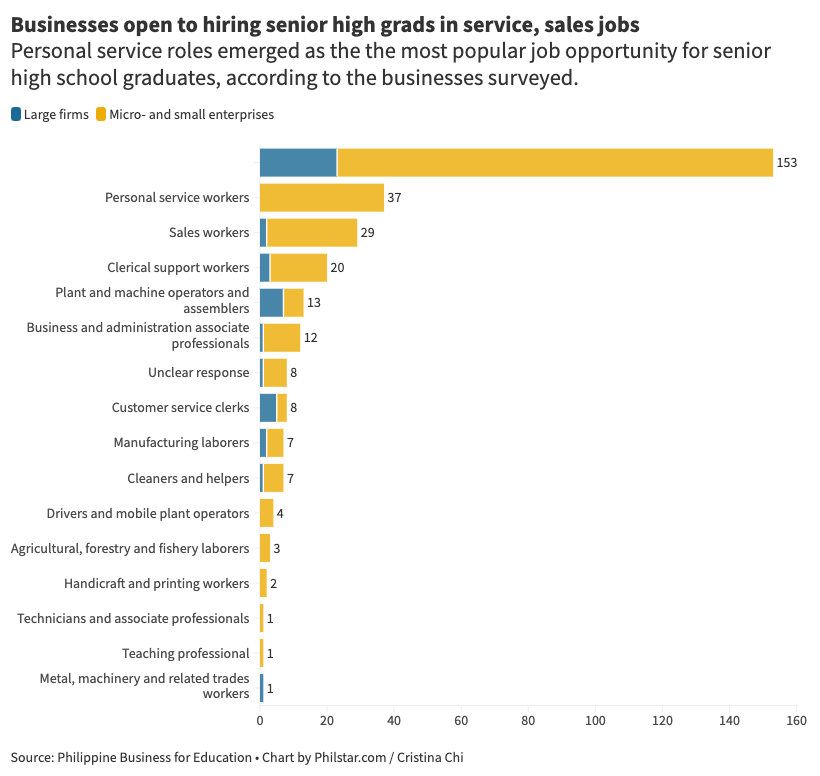More firms open to hiring K-12 grads, but most still prefer college degree-holders

MANILA, Philippines — More businesses in the Philippines are now willing to hire senior high school graduates than before, but preference for college diploma-holders remains overwhelming, according to a new study by a private sector-led education advocacy group.
The Philippine Business for Education (PBed) also found based on their survey of nearly 300 companies nationwide that most job opportunities available to K to 12 graduates remain limited to service, sales and clerical support roles.
Published on July 10, the PBEd study captures the employment and labor situation awaiting the first cohort of full-fledged K to 12 students who graduated this year.
The study also comes six years after PBEd's 2018 pilot study on the first batch of senior high graduates, the findings of which have been cited as evidence of high school graduates' poor employability in the House of Representatives' ongoing deliberations on amendments to the K to 12 law.
PBEd's latest study shows that four out of five firms are willing to hire senior high school graduates, up from the results of the 2018 study where only three out of five expressed openness to the idea.
Meanwhile, two out of five firms surveyed said they had established policies for the equitable hiring of senior high school graduates, higher than the one out of five in 2018.
Most or 86% of the survey respondents were micro, small, and medium enterprises (MSMEs), while large companies tallied to around 14%. PBEd said it used purposive sampling "since the target respondents were difficult to recruit for the study."
Almost half of the firms surveyed said they currently hire K to 12 graduates, and a higher percentage of large firms (63%) hired senior high school graduates than MSMEs (43%).
Firms that had policies in place for the equitable hiring of senior high school graduates reported implementing the following strategies: more than half said they enforced competency-based hiring and included disclaimers in job advertisements that the role does not require a college degree (55%), while around half said they opened college graduate employment to non-college graduates (52%).
Senior high grads defeated by college diploma-holders
While nearly half of all firms surveyed said they had available jobs for K to 12 graduates, these are mostly entry-level positions in the service sector or entry-level administrative jobs that fresh college graduates are already vying for.
PBEd noted that the industry still "generally prefers" hiring applicants with a college degree. For instance, employers said they expect that 73% or 12,544 of their 17,273 entry-level jobs in 2024 would be filled by college graduates, leaving less than a quarter to senior high school finishers.
More than half of the types of jobs expected to be filled by senior high school graduates are in personal service (24%) or sales (19%) roles, according to the study.

Other entry-level jobs available to senior high school graduates are plant and machine operators and assemblers (9%) and business and administration associates (8%), customer service clerks (5%), manufacturing laborers (5%) and cleaners and helpers (5%).
Ahead of DepEd's revised curriculum for senior high school, which is targeted to be launched next year, the survey found that most businesses (62%) are unsure if they will hire more K to 12 graduates over the next two years.
Only less than a third (29%) predicted an increase in hiring K to 12 graduates in their companies in the next two years, the survey found.
'Purpose of K to 12' questioned
PBEd has previously noted that the 80 hours of mandatory work immersion in the senior high school curriculum may be inadequate for employers to consider students as job-ready.
In 2023, the Department of Labor and Employment said senior high school graduates landed just 116 out of the 9,000 job vacancies advertised through its K-12 job fair in 2022, while the rest went to applicants with higher educational backgrounds.
The dismal hiring rate of senior high school graduates in a job fair held specifically for them led Sen. Raffy Tulfo to ask: "What's the purpose of K to 12?"
Sen. Sherwin Gatchalian, chairperson of the Senate basic education panel, asked a similar question in 2023 after the Civil Service Commission (CSC) admitted that it did not prioritize senior high school graduates over those who finished just four years of high school for its entry-level positions.
After calling the government the "greatest violator" of the K to 12 law, Gatchalian asked: "How do you expect our private corporations to hire senior high school students when the government itself does not hire senior high school students?"
Republic Act 10533 or the K to 12 law requires the government to monitor and evaluate the implementation of the program, as well as release a midterm report by the end of School Year 2014-2015.
But a Commission on Human Rights report in 2023 noted that it has yet to receive this report from DepEd.
President Ferdinand Marcos Jr. last week said that improving the employability of Filipino high school graduates was "one of two elements" that he discussed with incoming DepEd Secretary Sonny Angara.
Angara, who championed K to 12 when he was a senator, has vowed to continue reviewing the program under his leadership.
- Latest
- Trending





























